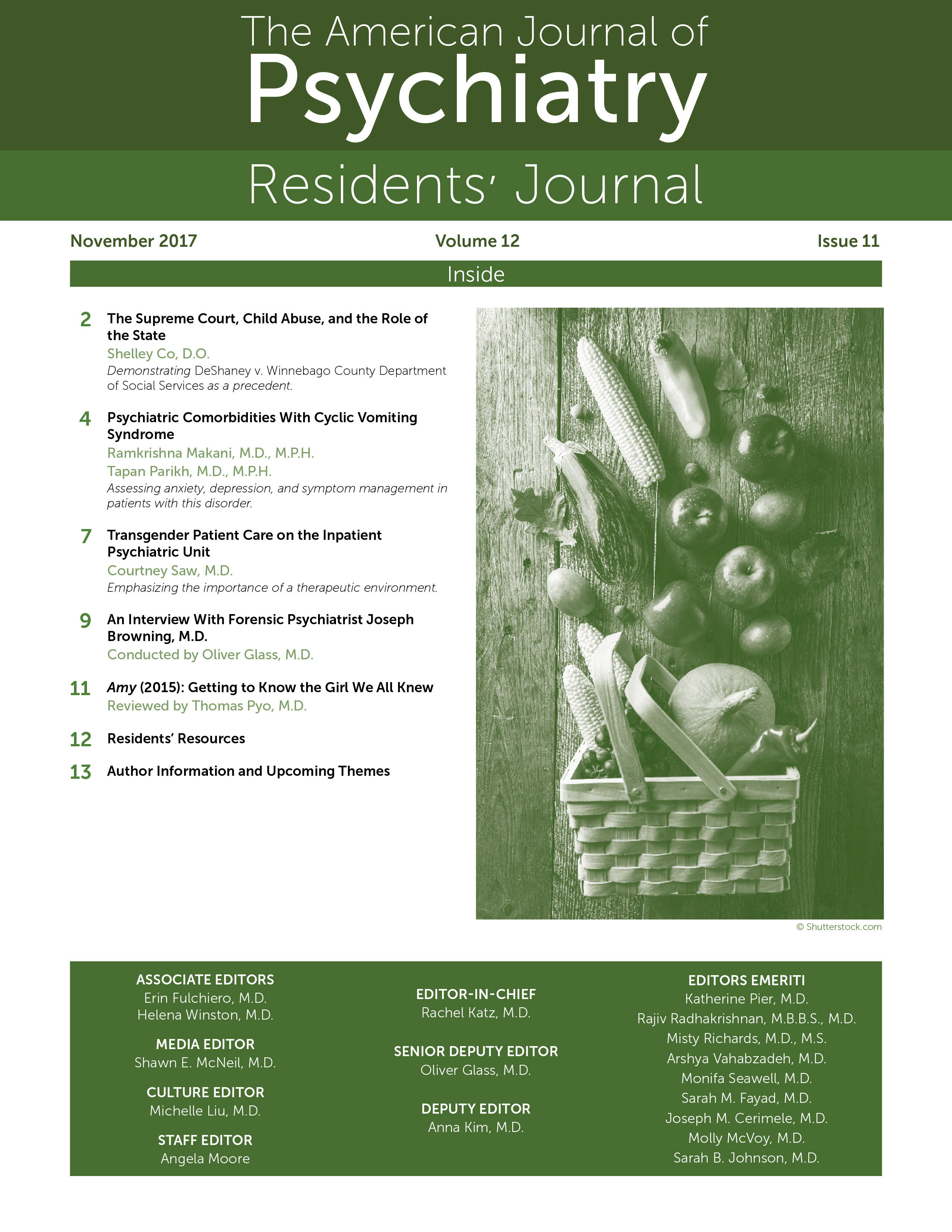The following is an interview with Joseph Browning, M.D., on forensic psychiatry, conducted by Oliver Glass, M.D.
Dr. Browning is a forensic psychiatrist who works at Georgia Regional Hospital in Atlanta, where he performs court-ordered evaluations of competency to stand trial and criminal responsibility. He is also a faculty member at Emory University, where he teaches forensic psychiatry fellows who conduct rotations at Georgia Regional Hospital. He has performed hundreds of formal forensic evaluations and recently served as an expert witness in high-profile cases involving Hemy Neuman and Jesse James Warren. Dr. Browning completed his forensic psychiatry training at Emory University.
Dr. Glass is a fifth-year geriatric psychiatry fellow at Emory University and will be a forensic psychiatry fellow, also at Emory, in the 2018–2019 academic year; he is also Senior Deputy Editor of the Residents’ Journal.
Dr. Glass: Dr. Browning, What made you choose to be a forensic psychiatrist?
Dr. Browning: As a trainee, I was attracted to the challenge of critically thinking about a person’s diagnosis, behavior, and its intersection with the law. The forensic psychiatrists I encountered in my residency program were thoughtful and confident, and I really wanted to be a part of that.
Dr. Glass: What recommendations do you have for psychiatry residents wanting to become forensic psychiatrists?
Dr. Browning: Do it! Seek out mentors in your program who do forensic work, set up electives, and get involved. My residency program did not have any required forensic rotations, so I worked with Peter Ash here at Emory to set up an elective in order to get a taste of what forensics was all about. It was a great experience and opened up a whole new world of psychiatry for me.
Dr. Glass: What should a forensic psychiatry applicant look for in a program?
Dr. Browning: I always tell applicants to the Emory program that they should be looking for fellowship programs that are heavy on evaluation and lighter on treatment. Psychiatry residents have 4 years to learn treatment, but a forensic fellowship is only 1 year. In my opinion, fellows get the most out of spending that year doing as many evaluations as they can. Applicants should also look for a program that provides a good mix of civil and criminal work.
Dr. Glass: How does a forensic psychiatrist make a name for him-/herself?
Dr. Browning: By doing good work. I teach fellows to approach every case objectively and to start with basics. Assume that nobody has ever sat down and really taken a critical look at the diagnosis, the records, and the circumstances of a case. Answer the forensic question that is asked, and give an honest opinion regardless of who might have requested the evaluation. Doing consistently thorough and thoughtful work shows people that you are reliable, dependable, and trustworthy. It makes courtroom testimony so much easier when you have earned the respect of the attorneys and judges you work with.
Dr. Glass: How did you get selected to be an expert witness in the Hemy Neuman case?
Dr. Browning: When the Hemy Neuman case was being retried, the Court ordered an objective evaluation of Mr. Neuman’s criminal responsibility. State authorities chose me as the psychiatrist to do the evaluation, since I had a great deal of courtroom experience gained from teaching and working in the system for so many years, and they felt confident I could manage the case. They paired me with a seasoned psychologist to collaborate on the evaluation, and we spent several weeks working together to pore over the evidence and form an opinion.
Dr. Glass: What did you learn from your involvement in that case?
Dr. Browning: Every evaluation I perform is a learning opportunity, and this case was no exception. I spent a lot of time working on what is and what is not bipolar disorder, and I had to figure out how to effectively convey that to a jury in a high-stakes case. I also spent a lot of time with Georgia’s unique statutes on criminal responsibility and tried to package that information in such a way that jurors could understand the complexities. More than anything, I learned about managing my own anxiety in my first high-profile court case. I was aware prior to my testimony that the expectations were high and that my testimony would have pretty extensive media coverage. I learned that I could rely on my training and my skills to work through this case just as I have all the other cases where I have evaluated people and testified in court. At the end it was very rewarding, and I am proud of the work that my colleague and I did.
Note: Hemy Neuman was convicted of murdering his lover’s husband outside of a daycare center. Though initially found guilty but mentally ill, Neuman was retried and convicted of malice murder. Dr. Browning testified as an expert witness in the retrial. Dr. Browning’s testimony in the Hemy Neuman retrial is
available for viewing on YouTube.